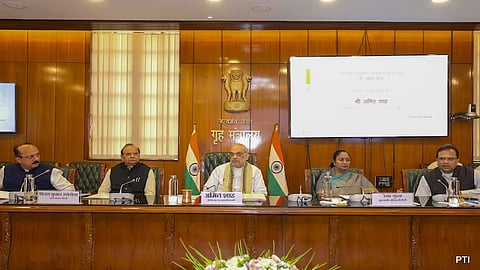

NEW DELHI: Union Home Minister and Minister of Cooperation Amit Shah on Monday chaired a review meeting in the national capital with Lieutenant Governor VK Saxena and Chief Minister Rekha Gupta to review the implementation of three new criminal laws in the national capital.
The meeting reviewed the implementation and current status of various new provisions related to police, prisons, courts, prosecution and forensics.
Among those in attendance were Union Home Secretary, Chief Secretary of the National Capital Territory, Commissioner of Delhi Police, Director General of the Bureau of Police Research and Development (BPR&D), Director of the National Crime Record Bureau (NCRB) and senior officials from the Ministry of Home Affairs (MHA) and the Delhi government. The three new laws are Bharatiya Nyaya Sanhita, Bharatiya Nagarik Suraksha Sanhita and Bharatiya Sakshya Adhiniyam.
These laws were conceptualised with the vision of the Prime Minister to replace colonial-era laws that persisted post-independence and to reform the judicial system by shifting the focus from punishment to justice. They came into force on July 1, 2024, replacing the three old criminal laws including Indian Penal Code (IPC), the Criminal Procedure Code (CrPC), and the Indian Evidence Act.
In his address, Shah stated that the implementation of the three new criminal laws will enhance the efficiency and accountability of the police at the grassroots level. The HM issued directives to ensure accountability of officers in the implementation of these new criminal laws. Shah emphasized that the process of filing charge-sheets within 60 and 90 days must be continuously monitored, with strict adherence to their timelines.
He further directed that efforts be made to increase the conviction rate in cases of heinous crimes by at least 20 per cent. Shah also said e-Summons should be issued directly from courts, with copies sent to local police stations, and also called for expediting the appointment process in the Directorate of Prosecution and ensuring that decisions regarding appeals in any case are made by the Directorate of Prosecution itself.
New laws conceptualised to replace colonial-era laws
These laws were conceptualised with the vision of Prime Minister Narendra Modi to replace colonial-era laws that persisted post-independence and to reform the judicial system by shifting the focus from punishment to justice. They came into force on July 1, 2024.